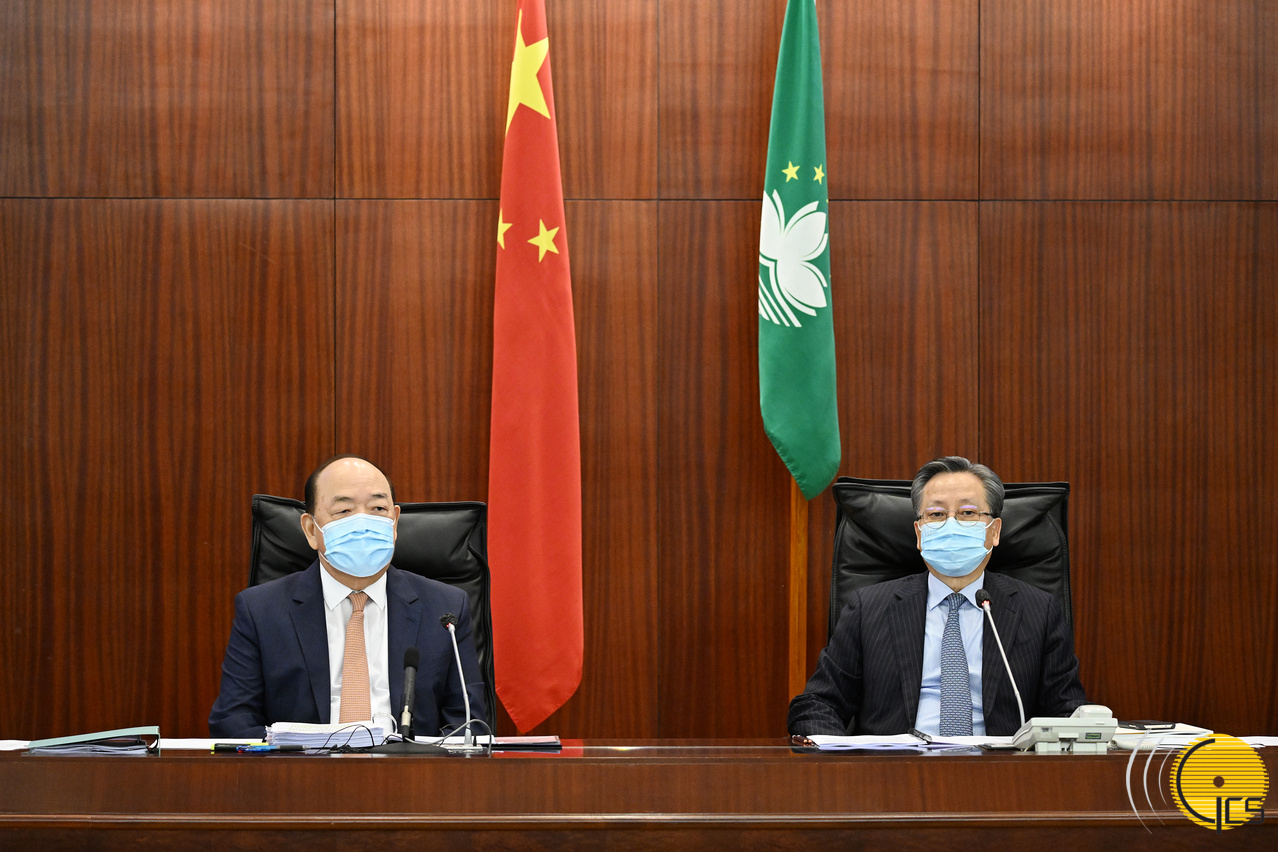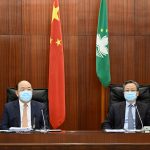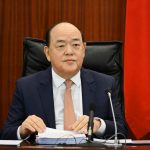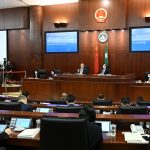 The Chief Executive, Mr Ho Iat Seng, attends a plenary session of the Legislative Assembly to answer questions raised by Legislative Assembly members concerning the Policy Address for the Fiscal Year 2023.
The Chief Executive, Mr Ho Iat Seng, attends a plenary session of the Legislative Assembly to answer questions raised by Legislative Assembly members concerning the Policy Address for the Fiscal Year 2023.
During a question-and-answer session at the Legislative Assembly on Wednesday (16 November), the Chief Executive, Mr Ho Iat Seng, shared details of the Government’s work on various matters, including the Islands District Medical Complex, “sandwich-class” housing, sub-district urban planning, the cultural industry’s development, and preparation for the 15th National Games.
On Tuesday (15 November), the Chief Executive had delivered the Policy Address for the Fiscal Year 2023, entitled “Making Progress Jointly while Ensuring Stability”.
In Wednesday’s question-and-answer session about the Policy Address, Mr Ho said it was expected the Islands District Medical Complex would be operational in phases, starting from 2023. The Government’s partnership with the Peking Union Medical College Hospital aimed to ensure that the medical complex would be an integrated medical centre of national standard, able to serve the communities of the Guangdong-Hong Kong-Macao Greater Bay Area and other neighbouring cities.
The Islands District Medical Complex was crucial for Macao to develop its “Big Health’ industry, stressed Mr Ho. The complex would be equipped with a high-quality medical team and facilities to treat special cases and serious cases. He was confident that the medical complex would operate effectively, helping to minimise the inconvenience to the Macao public that would otherwise occur were it necessary for them to seek treatment elsewhere, added Mr Ho.
Regarding housing for the “sandwich class”, the Chief Executive said the Government had submitted to the Legislative Assembly a bill concerning the Sandwich Class Housing Scheme. The Government had a plan to build related accommodation on a site at Avenida Wai Long, to be implemented once the bill passed at the Legislative Assembly.
The Government proposed relaxation of the rules in a bill of the Sandwich Class Housing Scheme regarding which types of housing units to be offered and relevant application criteria. Members of the public should consider carefully whether they wished to apply either for the Home-Ownership Scheme or for the pending Sandwich Class Housing Scheme, said Mr Ho.
Regarding the ongoing public consultation on the detailed urban planning of the Eastern District-2, Mr Ho said the Government suggested some space should be reserved there for building museum facilities; exhibition facilities; library space; theatre facilities; and a centre for the preservation of – and transmission regarding knowledge about – the Palace Museum's cultural heritage.
According to the detailed planning proposal, the Eastern District-2 – in the coastal portion of the peninsula – would be mostly for public housing and supporting facilities, including green spaces and public open spaces, said Mr Ho.
The Chief Executive also talked about the Government’s plan to build in phases the Coloane Round-the-Island Leisure Walkway, which would start from Seac Pai Van Country Park and connect multiple leisure attractions in Coloane.
In response to questions from lawmakers, Mr Ho said the cultural industry was one of the four pillars to foster Macao’s adequate economic diversification. The Macao Special Administrative Region (MSAR) Government and the Ministry of Culture and Tourism of China would sign an agreement to set up a joint committee to transform Macao into a multiple-culture exchange and cooperation base with an emphasis on Chinese culture. The committee would be responsible for promoting exchanges relative to China’s culture and foreign cultures, expand cooperation between the mainland and Macao, boost training of qualified people in the field of culture, and coordinate important work on the “One Base” initiative, i.e., to develop Macaoasamultiple-culture exchange and cooperation base with an emphasis on Chinese culture.
According to the Outline Development Plan for the Guangdong-Hong Kong-Macao Greater Bay Area, “tourism+ culture” would be a major area in which Macao would strengthen cooperation with cultural institutions on the mainland. Mr Ho gave a few examples of cooperation on cultural affairs, such as the Government’s partnership with the China Media Group for producing video projects about Macao’s development progress and the city’s culture.
In addition, Macao had to take advantage of its historical and cultural resources to promote Chinese culture. To this end, the Government had plans to revitalise several historic pieces of architecture, including the Mandarin's House, the Dom Pedro V Theatre, and the Navy Yard, by introducing augmented reality (AR) features and publicising them through two major social media platforms on the mainland. The Government would also step up effort regarding compilation of the Macao Local Records, Mr Ho added.
In the question-and-answer session, Mr Ho also shared information on progress regarding co-organisation of the 15th National Games. Preparatory work was proceeding. The Government was working closely with the General Administration of Sport of China and relevant authorities in Guangdong Province and in the Hong Kong SAR. The Government had additionally set up a local organising committee in order to coordinate interdepartmental work.
The Guangdong, Hong Kong and Macao authorities would not invest in new facilities for the National Games. Instead, the games would be using existing facilities following their maintenance and upgrade. Macao would host no more than 10 sporting events, taking into account the city’s overall situation and making use of its experience in that area. It was expected that 10,000 local volunteers would be recruited for the event, with recruitment work to begin in the first quarter of 2023, said Mr Ho.
During the question-and-answer session, the Chief Executive took questions from a total 31 members of the Legislative Assembly. Other topics discussed included industrial development, youth affairs, land use, employment, price stabilisation, attracting trade and investment, the digital economy, e-government, application of 5G telecommunication technology, disadvantaged groups within society, care for the elderly, mental health, epidemic-prevention policies, the tourism market, higher education, medical affairs, and professional certification.




